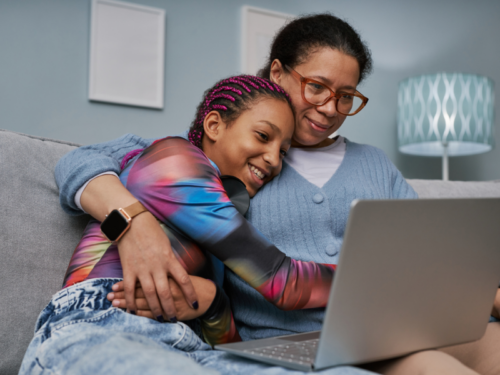
Table of Contents
Why Online Therapy Is Effective for Teenagers
Written By: Charlie Health Editorial Team
Updated: July 10, 2023
7 min.
Online therapy is effective for teenagers and offers a number of benefits compared to in-person therapy. Read our blog to find out why teens should choose a virtual option.
Learn more about our Clinical Review Process
Table of Contents
Is virtual therapy effective?
For many teens, the thought of sitting in a therapist’s office and pouring out their feelings to a stranger isn’t ideal. However, online therapy sessions might not sound so bad.
With the rise of telehealth at the beginning of the COVID-19 pandemic, psychotherapy has evolved to meet the demands of a younger generation. Virtual therapy has been around for decades, but technological advancements have created new opportunities for professional therapists, clinical social workers, psychologists, and psychiatrists to offer remote mental health services.
Online therapy is here to stay, but many parents wonder whether online therapy is a good idea for their teens. Whether you’re navigating different online therapy platforms or transitioning from in-person therapy, here’s everything you need to know about online therapy for teens.
Research shows that online therapy is effective for teens
Studies consistently show that online therapy is an effective treatment for a wide range of issues, including major depression, panic disorder, and bipolar disorder. Teenagers tend to be receptive to working with therapists using computer-based therapy, through mobile apps, live chat, text therapy, and video sessions.
According to a 2016 study, 72% of adolescents said they would access online therapy if they experienced mental health challenges. Moreover, 32% said they would choose online therapy over face-to-face therapy sessions.
If you’re thinking about online therapy for your teen or you’ve noticed signs of mental health issues, start by talking to your teen’s medical doctor. Because some mental health symptoms can mimic physical health conditions, it’s important to rule out any underlying health issues that may contribute to their symptoms.

Life-saving mental health treatment from home.
Learn today if our online treatment program is right for your teen.
Your teen’s healthcare provider can advise whether online therapy is a good option based on your teen’s specific needs. If your teenager has a serious mental health condition or your doctor has concerns about safety risks, online treatment might not be the best option. For example, if your teenager is actively suicidal, your teen’s healthcare provider may provide a referral to an inpatient treatment program for immediate support.
If your teen’s healthcare provider recommends online therapy for your teen, you have the green light to start researching online therapists. Like any other form of treatment, you’ll need to consider your teen’s opinions, needs, and preferences when making a final provider decision. According to the American Psychological Association (APA), therapy requires collaboration between your teen and their therapist. As a result, their investment and interest can make a significant difference in their mental health outcomes.
What signs and mental health symptoms show your teen needs therapy?
Every mental health condition is unique, and symptoms can vary from person to person. With that said, all mental health conditions impact emotions, thoughts, and behaviors. If you’re deciding whether to start the conversation with your teen, here are some signs and symptoms to look out for.
Disruptions to their daily life, routines, and relationships
Everyone has “bad days” from time to time, but if your teen struggles routinely with daily tasks, it’s important to take notice. Depending on your teen’s daily activities, this might look like relationship issues with friends and family members, poor academic performance, personality changes, or low motivation.
Excessive anxiety
Anxiety is a normal reaction to stressful or threatening situations. It’s normal for teenagers to feel worried before important exams, deadlines, and sports games. But you should pay attention when the amount of stress and anxiety feels out of proportion to the risk. If your teen experiences panic attacks, feels constantly worried, or experiences intrusive thoughts (obsessions) or behaviors (compulsions), they may have a diagnosable anxiety disorder.
Depression
We all feel “down” at some point, especially when setbacks happen. But if your teen experiences a persistent low mood, low energy, self-esteem issues, or suicidal thoughts, reach out to a mental health professional.
Substance abuse
Watch out for behavior changes that may be due to substance use. Teenagers may abuse alcohol, marijuana products, psychedelic drugs, prescription medications, or other substances. Substance abuse can also extend to the misuse of over-the-counter drugs or medications.
School performance changes
Some teens have challenges with academic work—and that’s normal. But if your teen typically receives high grades and starts having problems, there may be an underlying mental health condition to blame. If academic issues persist, a licensed therapist can help your teen reach the root of the problem.
Acute or chronic stress
When teens experience violence, trauma, or abuse at home, they’re likely to experience acute or prolonged stress. Post-traumatic stress disorder (PTSD) often involves flashbacks, panic, and recurring thoughts of the traumatic event. Psychotherapy can help your teen process those experiences so they can start healing.

How can online therapy services help your teen?
Virtual teen therapy can help teenagers understand their mental health, learn lifelong coping strategies, and manage their symptoms. If you’re weighing the pros and cons of online counseling and traditional therapy, here are some reasons why teletherapy might be the best option for your teen.
- Teens feel more comfortable with the internet. Most teenagers enjoy chatting online, so accessing psychotherapy online can feel more comfortable than talking to a therapist face-to-face. Virtual therapy can help your teen engage with the therapeutic process, improve their quality of life, and work toward their goals in a supportive and familiar environment.
- Teletherapy is more convenient. For most parents and teens, online therapy is the most convenient option. You don’t have to worry about commutes to and from the therapist’s office, and your teen doesn’t have to interrupt their schedule for therapy appointments. For teenagers living in rural areas or without transportation, online appointments provide easier access to quality mental healthcare. Many online therapists also offer evening and weekend appointments.
- There’s less stigma attached. Sometimes, teens feel embarrassed about therapy and might fear that their peers will find out they’re going to therapy. Online counseling and other telehealth services can help your teen access treatment from the comfort of their own home so they never have to worry about awkward confrontations or waiting room anxiety.
- Virtual therapy can be a more affordable option. Some online therapy platforms offer more affordable mental health services than traditional therapy. At Charlie Health, we’re proud to offer accessible online therapy. We work with major insurance plans, including Medicaid, so your teen can access mental health treatment without breaking the bank.
If your teen needs additional support beyond traditional face-to-face therapy, Charlie Health’s virtual Intensive Outpatient Programs (IOP) can provide a higher level of care.
Our virtual IOP is designed for adolescents, teens, and young adults who need support beyond once-weekly therapy. We provide a comprehensive treatment program that combines supported groups with individual and family therapy, plus psychiatric support if needed, to create a customized treatment plan based on your teen’s specific needs. Our IOP typically lasts 9 to 12 weeks, with 9 to 11 hours of weekly treatment services—all from the comfort and safety of home.
How can you find the right online therapy provider?
Finding the right therapist can feel overwhelming, but it doesn’t have to be. With Charlie Health, you don’t have to spend hours scrolling through online therapy sites, reading psychologist directories, or comparing subscription plans. Whether you’re trying online therapy for the first time or searching for a new online therapist, we’re here to help you find the right fit for your teen and family.
When you’re ready to reach out for professional help, Charlie Health’s Admissions Team is available to answer your questions. After you learn more about our program, we’ll schedule a clinical consultation to learn about your teen’s specific issues. Then, we’ll build a treatment plan that offers individualized mental health support.
Based on your consultation, we’ll assign a primary therapist that specializes in your teen’s treatment needs. Your teen’s online therapist will provide support throughout the treatment process, from admission to aftercare. We’ll also connect your teen with a highly curated support group with peers of similar backgrounds.
Psychotherapy, or talk therapy, can help your teen find real solutions to improve their mental health. Our IOP includes comprehensive access to a wide range of evidence-based therapeutic interventions, including cognitive behavioral therapy (CBT) and dialectical behavior therapy (DBT), so your teen can access comprehensive mental health support.
Our compassionate mental health professionals are here to guide and support your teen on their journey toward mental wellness with sustainable healing, aftercare planning, and ongoing mental health support. We believe that everyone is capable of improving their mental well-being and achieving their therapy goals. Sometimes, it just takes a gentle nudge in the right direction.
Online therapy for teenagers at Charlie Health
At Charlie Health, our virtual IOP provides comprehensive mental health care for adolescents, teenagers, young adults, and their family members. Our IOP combines individual therapy, group sessions, family therapy, and medication management (if needed) to create a personalized treatment plan for your teen.
Whether your teen is navigating trauma, dealing with relationship issues, or needs emotional support beyond weekly therapy sessions, we’re here to help. Our licensed clinicians will help your teen regain strength, learn lifelong coping skills, and start feeling better.We know that reaching out takes courage. We’re here to listen to your needs, answer your questions, and start the healing process. Fill out this form today to learn more about our teletherapy treatment options for teenagers.




